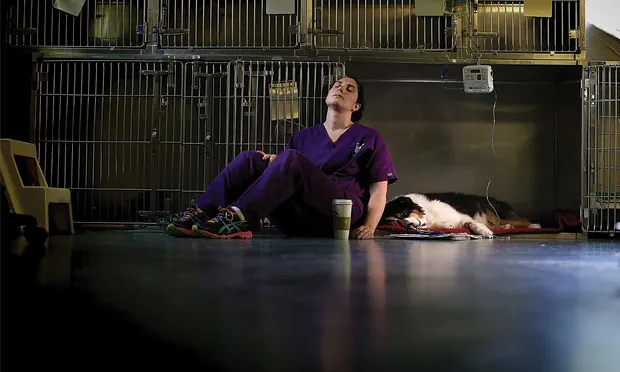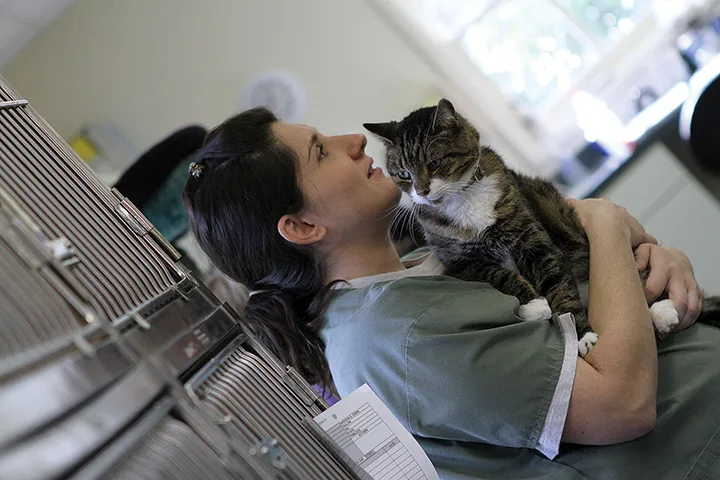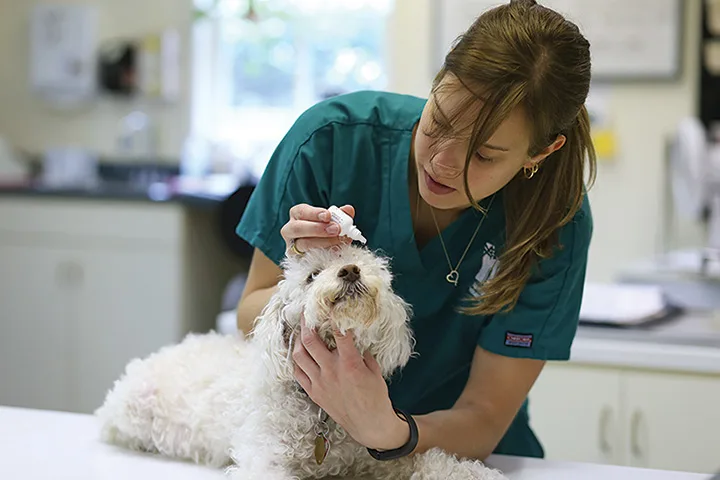OPINION: Veterinary Nurse vs Veterinary Technician?

"Call Me a Veterinary Technician”*
Melissa Supernor, AS, BS, CVT, RVT, VTS (SAIM), VCA Westboro Animal Hospital, Westboro, Massachusetts
In the U.S., we have been called veterinary technicians since the early ’80s, but there is now a push to call us veterinary “nurses” as they do in other countries, including the United Kingdom.
I think we should stick with “veterinary technician.”
To change things and to start calling us “nurses” now would definitely be a difficult task and cause a lot of disruption in our profession, as well as confuse us with human nurses (who, as I understand it, have a trademark on the word “nurse”).
To me, the bigger point is not about what we call ourselves, but how we represent ourselves. It is about education—educating the general public about who we are and the veterinary community about our expertise and passion.
Let’s compare veterinary technicians to other similar professions. Are we similar to teachers, nurses, dietitians, dental hygienists, or counselors?
The answer, of course, is that we are a combination of all of the above. Think about all the different aspects of our jobs. We wear so many hats every day—one minute we could be the radiology tech, then the pharmacy tech, then the surgery tech, then the dental hygienist. In the examination room, we take care of much more than a patient. Yes, we are the patient advocate and caregiver, but we are also the client educator, the communicator, counselor, and advocate. We do so much more than taking histories, keeping records, giving injections, and taking blood. We are usually with the client and the patient from the time they arrive at the practice until they leave.
Plus, how many species do we learn about, know about, and work with? Those with paws, wings, hooves, flippers, and no feet at all—not just two-legged animals.
What do nurses do in their day and whom do they work on? With their limited responsibilities and only one kind of patient—hmm, for me, it’s an easy choice which I would prefer to be.
Back to my bigger point. As the veterinary technician profession grows and veterinarians come to rely on us more and more, the world is at our fingertips. We are the heart of the veterinary team and the keeper of the human–animal bond. It is our job to ensure everyone knows that, and to fight for recognition and our reputation. It is also our responsibility to improve ourselves every day, which in turn will promote our profession.

As veterinary technicians, we are so much more than nurses. I say, stop worrying about what we are called. We know we have the best job in the world and take care of the best, most grateful patients. No matter what we call ourselves—veterinary technician or veterinary nurse—the important thing is to be proud and passionate about our profession.
And call me a veterinary technician
Editor’s note: Melissa Supernor is president of the Massachusetts Veterinary Technician Association, board member of the National Association of Veterinary Technicians in America, secretary and chair of the State Representative Committee, and board member and treasurer of the Academy of Internal Medicine Veterinary Technicians.
*This article is reprinted with permission from the North American Veterinary Community (NAVC). Veterinary Technicians can learn more about their field, earn continuing education (CE) credit hours, and network with peers at the NAVC Conference 2015 and on VetFolio.com.
Nursingclature—The Case for Veterinary “Nurse”
Caleb Frankel, VMD, Veterinary Specialty & Emergency Center, Greater Philadelphia, Pennsylvania
I do not routinely speak on others’ behalf, but I am taking a brief vacation from that policy because I think I am in the unique position to positively impact my colleagues.
Yes, I am a veterinarian.
And yes, as veterinary professionals, we face our share of challenges: the rising cost of education, the price of providing and keeping up with the advancements in care, hyperspecialization, the legal definition of “pet,” and efficiently educating the next generation. The list goes on.1
But there is another challenge that is easy to miss and often trivialized. You have to be deep in the trenches to fully see it, and it arguably crosses through all our other challenges. I’m referring to the veterinary “technician” challenge.
I argue that these vital members of our profession are often underpaid, overworked, and under-respected. Veterinary technicians, or veterinary “nurses,” as many progressive private and university hospitals unofficially refer to them, are the heart and soul of veterinary medicine.
Unfortunately, even the most highly skilled, passionate veterinary nurses are more a migrant population than the professionals they deserve to be. According to a recent National Association of Veterinary Technicians in America (NAVTA) survey, technicians are gradually moving away from clinical practice to pursue other opportunities.2

Who can blame them? Could you support your family on a salary that flirts with the American poverty line?3
This is not the fault of individual veterinary practices. After all, we all like to think we are undercompensated for the tremendously difficult (but awesome) job we hold. Instead, it likely stems from our profession’s collective issues coming to grips with our perceived societal value and worth.
A name change will not fix the problem, but combined with education, passion, and expertise, it is a step in the right direction.
The term “technician” is confusing and inaccurate. It originated from “technology,” which has many other connotations in today’s high-tech world. In human medicine, a medical technologist refers strictly to a laboratory employee.4 To the layperson, technicians conjure up images of people working with inanimate objects such as airplanes. “Nurse,” on the other hand, is an unmistakable and universally prestigious term describing a healthcare employee who serves as the patient-care guardian across all settings.5
Did you know that the United States is one of the few developed countries that does not refer to our own as veterinary nurses?
The term is just as much an “oldie” as it is a “goodie;” the first paraveterinary employees can be traced to England’s Canine Nurses Institute of 1908 where, commendably, they were officially called “canine nurses.”6,7
In the 1950s, the term “animal technician” was likely coined within the U.S. Air Force when veterinary medicine was rudimentary, at best.6,7 In the mid-20th century, when there were far fewer veterinarians, the vast majority exclusively treated livestock, and veterinary technicians primarily carried out milk and meat inspections, animal reproduction tasks, laboratory work, and veterinarian assistance.<sup7 sup>
Today, we have a booming small animal medicine industry, with veterinary nurses leveraged to perform true nursing roles.8 In my 40-veterinarian specialty practice, nurses are my eyes and ears with inpatients and my go-between for clients. I rely on their expertise for everything from restraint to phlebotomy to procedures to patient assessment.
The term “nurse” much more accurately reflects the role and responsibilities of veterinary technicians, and immediately gives clients a clear understanding of their worth.
Continuing to call them technicians—or worse, techs—cheapens and depersonalizes what our veterinary nurses do, and that in turn lessens what veterinarians do. The term “nurse” much more accurately reflects their role and responsibilities, and immediately gives clients a clear understanding of their worth.
So, I would like to float 3 new terms: “Veterinary Nurse Assistant,” “Registered Veterinary Nurse,” and “Registered Veterinary Nurse Specialist,” which would be designated based on formal training.
The naysayers will cite legacy and the challenge of change, which never stand the test of time. Performing a feline kidney transplant, conceptualizing the first iPhone, and putting a man on the moon were all difficult tasks, but that was no reason not to try.
I admit that legal issues surround the official use of “nurse,” but we can surely overcome those if we band together and advocate as a profession.
Early on, someone smarter than me understood the value of a name and made “veterinarian” synonymous with “doctor.” It is time to officially do the same for our valued veterinary technicians.